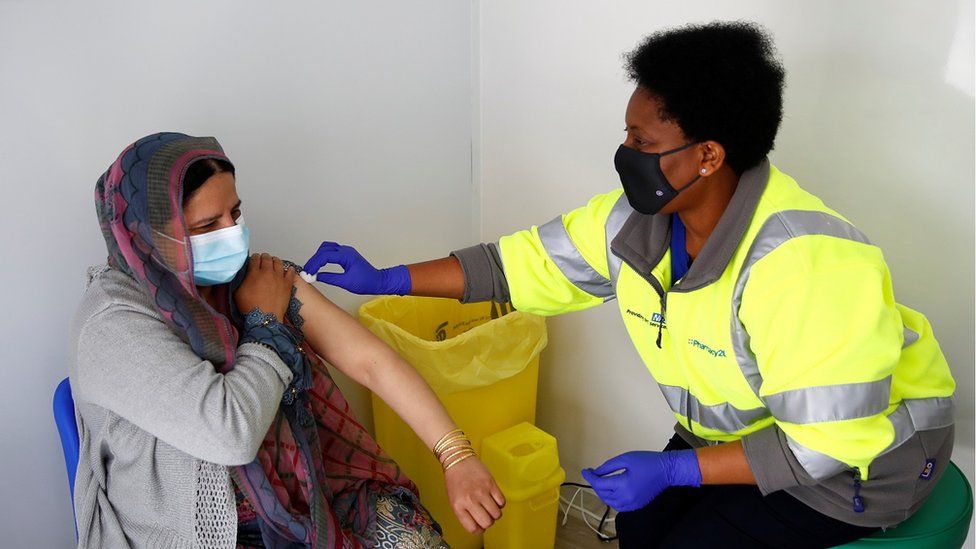
The Pfizer and AstraZeneca coronavirus vaccines are highly effective against the variant identified in India after two doses, a study has found.
Two jabs of either vaccine give a similar level of protection against symptomatic disease from the Indian variant as they do for the Kent one.
However, both vaccines were only 33% effective against the Indian variant three weeks after the first dose.
This compared with 50% effectiveness against the Kent variant.
Public Health England, which ran the study, said the vaccines are likely to be even more effective at preventing hospital admission and deaths.
Health Secretary Matt Hancock said the findings made him "increasingly confident" that the government was on track for the final stage of easing restrictions in England on 21 June.
The data showed that getting both doses of the vaccine was "absolutely vital", he added.
Home Secretary Priti Patel, speaking on Sky News, agreed the success of the vaccine programme is "enabling us all to live our lives".
In terms of the further unlocking planned for next month, she said Boris Johnson had been clear that there are "key tests and key stages" in the run-up to 21 June.
"We will always continue to look at the data when it comes to the next stage of the roadmap," she told Trevor Phillips on Sunday. "That is sensible and responsible."
The Pfizer vaccine was found to be 88% effective at stopping symptomatic disease from the Indian variant two weeks after the second dose, compared with 93% effectiveness against the Kent variant.
The AstraZeneca jab was 60% effective against the Indian variant, compared with 66% against the Kent variant.
Public Health England (PHE) said the difference in effectiveness between the vaccines after two doses might be explained by the fact that rollout of second doses of AstraZeneca was later than for the Pfizer vaccine, which was approved first.
Other data shows it takes longer to reach maximum effectiveness with the AstraZeneca vaccine, PHE said.
Some 12,675 genome-sequenced cases were included in the study, which took place between 5 April and 16 May. Only 1,054 of those cases were of the Indian variant, known as B.1.617.2.

'Very reassuring'

As the virus changes, protection against infection was always going to be the first thing that slips.
So the fact that the Pfizer and AstraZeneca vaccines offer such a high degree of protection against the Indian variant after the second dose is very reassuring given experts expect it to become dominant.
But what are the implications of the drop in effectiveness of the first dose where the Indian variant is concerned?
Given it's expected to become the dominant variant in the UK, it's now even more important people get their second jab.
The more difficult question to answer is what this means for the speed of the route back to normality.
Its ability to evade the vaccines even by a small degree will be a factor in how more transmissible this variant is here.
There are also other biological reasons why it might find it easier to spread.
But this does not necessarily mean we will see a surge in cases and, crucially, hospital admissions - the protection vaccines give us against serious illness will be much much higher than their ability to block mild infections.
The Indian variant certainly gives the virus a bit more of an advantage, but it doesn't mean the vaccines won't win out.

The study looked at data from all age groups from 5 April, to cover the period since the Indian variant emerged.
There is not enough data to estimate how effective the vaccine is against severe outcomes for the Indian variant, PHE said.
Dr Jamie Lopez Bernal, consultant medical epidemiologist at PHE and the study's lead author, said there was higher confidence in the data from the first vaccine dose than that from the second.
He said: "There are bigger numbers that have been vaccinated with one dose. So I think we classify that as moderate certainty around the first dose, but low levels of confidence around the second dose."
However, Prof Susan Hopkins, PHE's Covid-19 strategic response director, said the data trend was "quite clear" and was heading in the "right direction".
Meanwhile, Gordon Brown has urged Prime Minister Boris Johnson to use next month's G7 summit in Cornwall to step up funding of the global Covid vaccine rollout.
In an interview for BBC Radio 4's The World This Weekend, the former prime minister said what rich countries had given so far would not meet the needs of this year and next year.
He said: "If we allow this vaccine inequality to continue then we will have half the world vaccinated and protected, the other half unvaccinated and liable to be at greatest risk of dying.
"The disease will continue to spread and it will mutate and it will come back to haunt even the vaccinated in our own country."
In other news, more than 50 million coronavirus vaccine doses have now been given in England. More than 31 million people have had their first jab, and over 18m have had their second.
Some 13,000 deaths and 39,100 hospitalisations have been prevented in the UK due to the vaccination programme up to 9 May, according to PHE analysis.
https://news.google.com/__i/rss/rd/articles/CBMiJmh0dHBzOi8vd3d3LmJiYy5jby51ay9uZXdzL3VrLTU3MjE0NTk20gEqaHR0cHM6Ly93d3cuYmJjLmNvLnVrL25ld3MvdWstNTcyMTQ1OTYuYW1w?oc=5
2021-05-23 07:38:59Z
52781607945719
Tidak ada komentar:
Posting Komentar